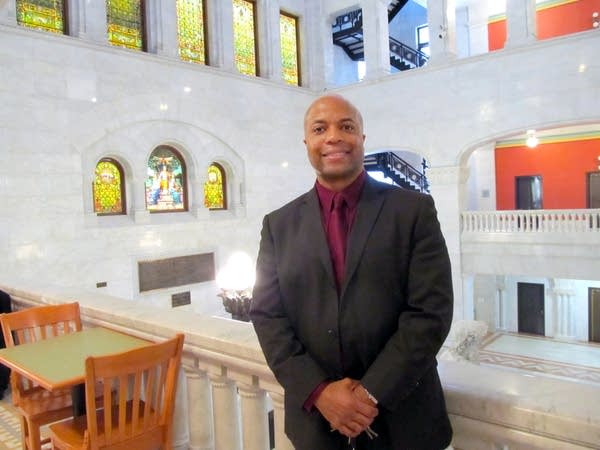Documents show rift between Minneapolis police, top brass
Go Deeper.
Create an account or log in to save stories.
Like this?
Thanks for liking this story! We have added it to a list of your favorite stories.

Minneapolis police officers slammed top department officials last year as "secretive," "vindictive," "incompetent" and "lacking in integrity" when they got the chance to comment anonymously on the state of the department.
According to those comments, the No. 1 thing Minneapolis police officers want to change about their jobs is the department's leadership. And they are livid about "dangerously" low staffing levels.
The blind comments were attached to surveys the department conducted last year. The department released a statistical analysis of the survey responses last summer showing officers had a significantly lower job satisfaction rate than other city workers.
That report, however, did not include the comments section of the survey, where employees could write whatever they wanted. MPR News got access to the comments after a seven-month battle with city lawyers. The comments reveal the depth and direction of the department's morale issues.
Turn Up Your Support
MPR News helps you turn down the noise and build shared understanding. Turn up your support for this public resource and keep trusted journalism accessible to all.
"Now that the administration is aware of how cops feel, what action are they going to take to identify more specific problems or work to change it?" asked Lt. John Delmonico, president of the Police Officers Federation of Minneapolis.
Department leaders say they are listening and making changes.

"The morale, certainly over the past year, has improved tremendously," said Deputy Chief Medaria Arradondo.
The department now requires all supervisors to meet with their employees once a month for a "check-in," said Arradondo, adding that those one-on-one meetings are a better way to gauge morale than the survey, which he notes less than half of department employees completed.
The regular check-ins, which were instituted shortly before the survey was conducted, have done wonders for both the rank-and-file and their managers, he said.
"The sergeants are invigorated and coming in and talking about their employees. And this gives them — those supervisors, those sergeants — an opportunity every month to really cheerlead the great work that their officers are doing."
The department is also aggressively hiring right now, which should alleviate another top concern raised in the survey: staffing levels.

Officers described them as "well beyond dangerous" and "near catastrophic" due to a change in state pension law that created an incentive for police to retire early last year. Several officers said leadership should have seen that coming and staffed up sooner.
One officer wrote: "We're holding the street together with spit and duct tape."
At the low point last year, the city had 776 officers on the street. The department won't be back to its full strength of 860 sworn personnel until sometime this year.
The department managed through the staffing shortage by asking officers to work an extra $1 million worth of overtime last year.
The city's elected officials want to use the wave of retirements to diversify the police, which is currently about 79 percent white. The anonymous comments show that while some members of the force are eager for more minority representation, others strongly object to race-based recruitment.
One officer wrote: "It is an insult that the city's leaders think that one needs only people of color to deal with people of color ... Stop pandering to the race baiters."
Another common complaint was inadequate access to training.
"Going on the stand and having to admit that I have little to no training in investigations, much less in my assigned specialty, IS EMBARRASSING AND NOT FUN," one comment read.
City Council Public Safety Committee Chair Blong Yang said he was shocked when he read the comments.
"I think morale translates into good performance in our police department. I think if our police officers are happier about doing their jobs, I think they do a better job," he said. "And if we have folks who show up who are just unhappy, it's just going to translate into how they interact with people out in the public, and I don't want to see that."
Yang says the City Council should take the survey into account when it's setting budget priorities this year, and when Chief Janeé Harteau's contract comes up for renewal next year.
Dissatisfaction within the Minneapolis Police Department is nothing new.
The last time the city conducted the survey in 2011, Tim Dolan was chief and the results were similar. About half the department had a positive "engagement" score, and only about 40 percent gave department leadership good reviews.
Police tend to have lower morale than other city workers, because their jobs are so hard, said City Council President Barbara Johnson, who's served on the council for 18 years.
"I think that in this day and age, it is even worse," she said. "You have a very vocal element of people that will come to a public hearing and stand up and say that police are corrupt. And it's really challenging for people to do try and do their jobs when they're called these awful names in public places."
But Mayor Betsy Hodges says just because police morale has been low for years, doesn't mean the city should accept it as normal.
"Is it true that we've experienced this over time? Yep," she said. "Is it on me as a leader of this city and the other leadership inside and outside of the department to do our best to be responsive to concerns? Absolutely."
Hodges says she believes the department is already taking steps to do that. And the mayor also says, in spite of the negative comments, she has "absolute faith and confidence" in Harteau.


